
The Cross is the Axis on which the Cosmos turns
But as for me, God forbid that I should glory save in the cross of our Lord Jesus Christ… — Apostle Paul (Gal 6:14) When St. Paul preached “Jesus Christ and him crucified,” the crucifix […]

But as for me, God forbid that I should glory save in the cross of our Lord Jesus Christ… — Apostle Paul (Gal 6:14) When St. Paul preached “Jesus Christ and him crucified,” the crucifix […]

 The Catholic faithful gathered in the Cenacle in Jerusalem for the Mass of the Lord’s Supper that the Franciscan friars celebrated on Holy Thursday, March 28, 2024. The Cenacle is at the center of strong tensions and disputes regarding ownership and rights of access and celebration. An ancient tradition places King David’s tomb here and over the centuries Jews and Muslims have leveraged this to first expel the Franciscans and then to prevent Christian worship, which they deemed sacrilegious. / Credit: Marinella Bandini
The Catholic faithful gathered in the Cenacle in Jerusalem for the Mass of the Lord’s Supper that the Franciscan friars celebrated on Holy Thursday, March 28, 2024. The Cenacle is at the center of strong tensions and disputes regarding ownership and rights of access and celebration. An ancient tradition places King David’s tomb here and over the centuries Jews and Muslims have leveraged this to first expel the Franciscans and then to prevent Christian worship, which they deemed sacrilegious. / Credit: Marinella Bandini
Jerusalem, Mar 28, 2024 / 17:15 pm (CNA).
On Holy Thursday, the doors of the Cenacle in Jerusalem were opened to welcome the Franciscans of the Custody of the Holy Land. In this “Upper Room,” called the Cenacle in the Holy Land, Jesus had his Last Supper, washed his apostles’ feet, and instituted the Eucharist.
It was here that the Franciscans celebrated the Mass of the Lord’s Supper, reenacting those same gestures. (At the Basilica of the Holy Sepulcher, however, the celebration is held on Thursday morning due to the Status Quo. Here is Cardinal Pierbattista Pizzaballa’s homily from that Mass.)
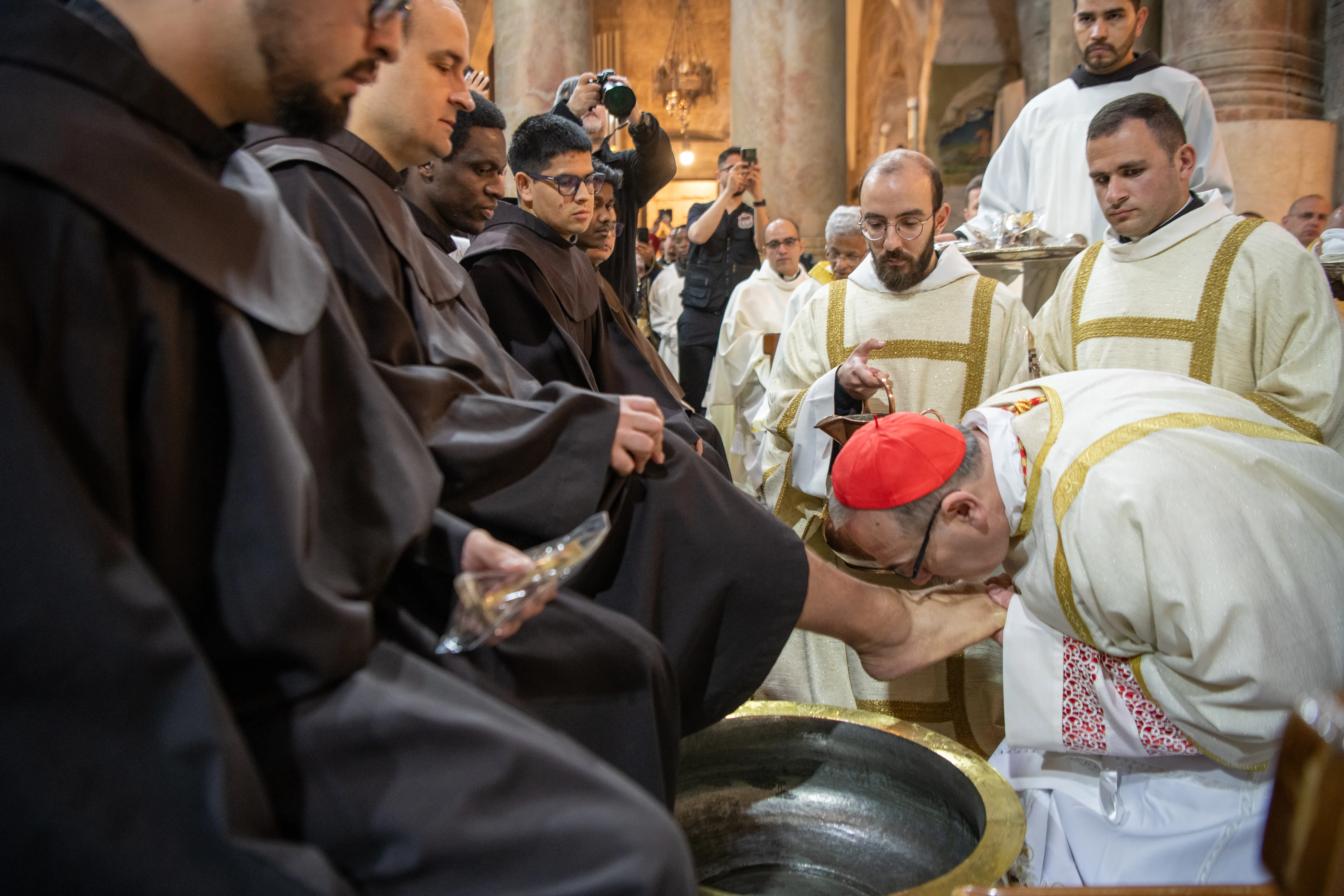
The custos of the Holy Land, Father Francesco Patton, presided over the Eucharistic celebration at the Cenacle. In his homily, before washing the feet of six teachers and six students from the Terra Sancta School in Jerusalem, he emphasized the value of the “new commandment” that Jesus gave to his apostles here: “As I have loved you, so you also should love one another” (Jn 13:34).
“To love means to give oneself and to serve,” he said. “In this celebration, we want to nourish ourselves with Jesus because if he is alive within us, then we too will become capable of loving one another as he loved us. And we also want to learn from Jesus not to be served but to serve.”
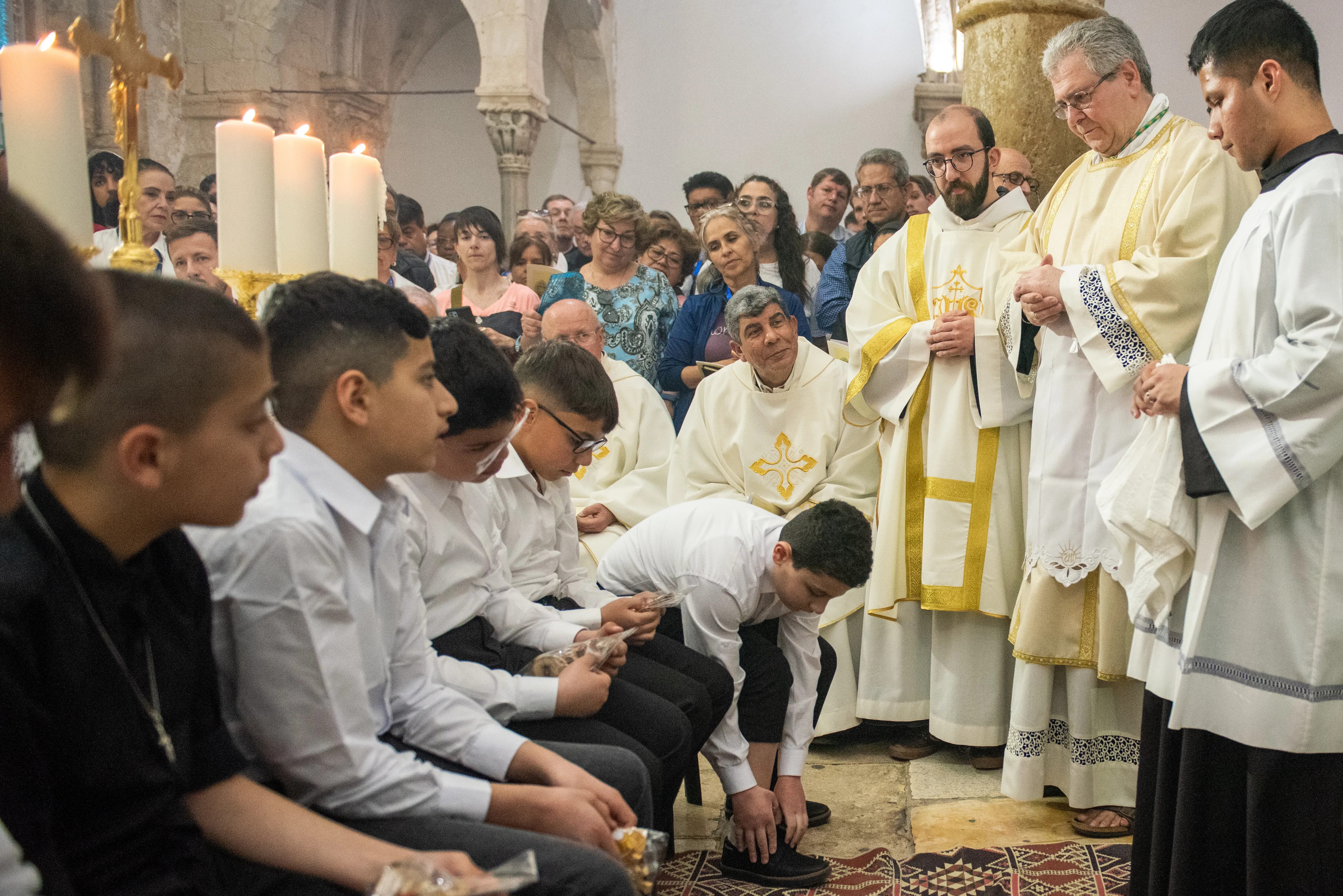
Holy Thursday is the only day, along with Pentecost Sunday, when the Franciscans have the right to gather in the Upper Room to pray. Usually, it is a liturgy of the word, but since 2021 they have celebrated Mass. Outside, Israeli Army personnel ensure security.
The Cenacle is at the center of strong tensions and disputes regarding ownership and rights of access and celebration. An ancient tradition places King David’s tomb here, and over the centuries, Jews and Muslims have leveraged this place to first expel the Franciscans and then to prevent Christian worship, which they deem sacrilegious.
Father Narciso Klimas, historian and archivist of the Custody of the Holy Land, explained to CNA: “The Custody has all the documents confirming our ownership of Mount Zion.” Even today, traces of Christian presence are visible, both in the architecture of the place and in some symbols.
“The presence of the Franciscans at the Cenacle,” Klimas explained, “dates back to 1342, but as early as 1333, the rulers of Naples, Robert of Anjou and Sancha of Majorca, acquired the land and donated it to the friars. This was the first headquarters of the Custody of the Holy Land.” To this day, the official title of the Custos of the Holy Land is “Guardian of Mount Zion and the Holy Sepulchre.”
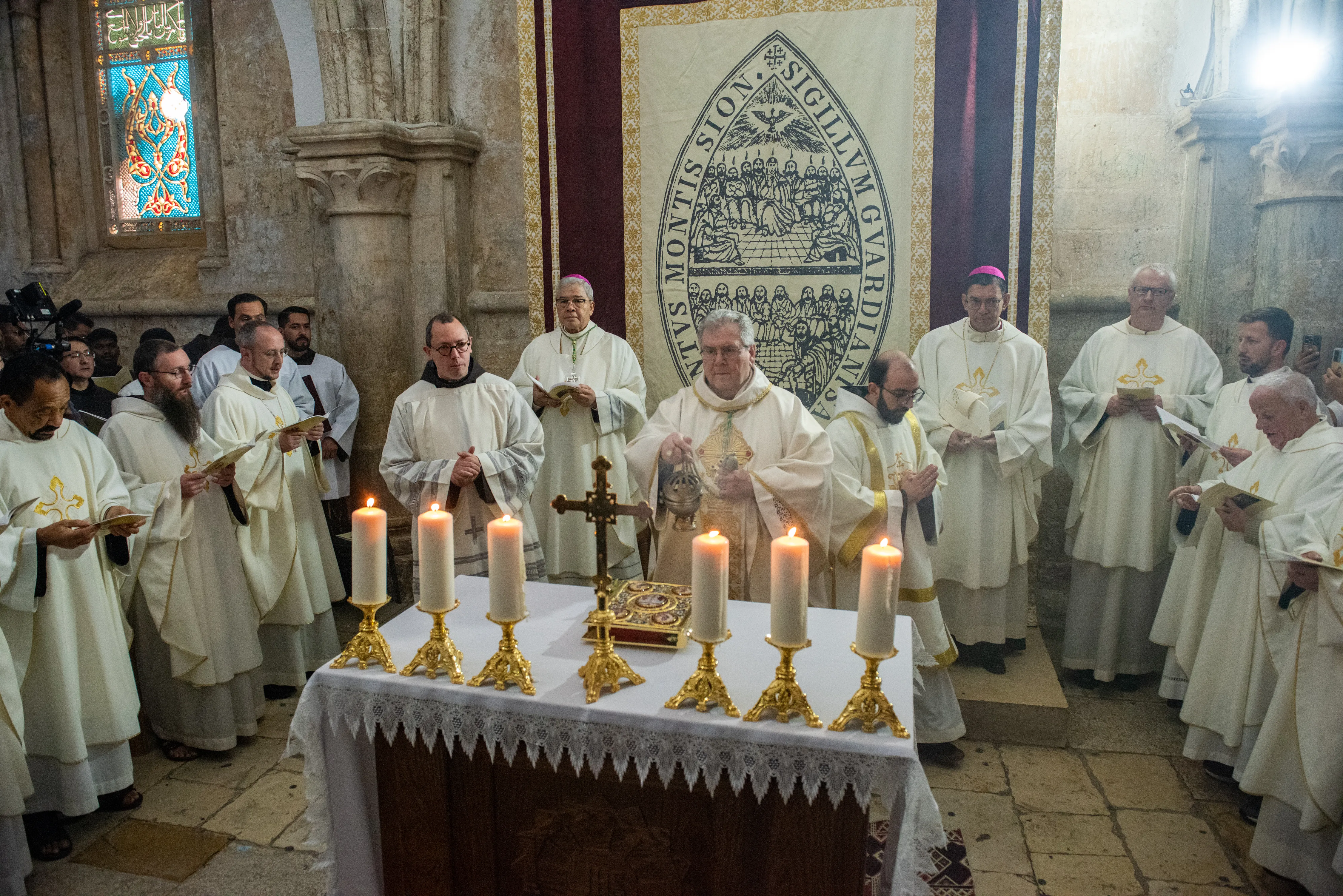
In 1421, a rabbi submitted a petition to the local emirs, claiming the right for Muslims and Jews to this place due to the presence of King David’s tomb. One hundred years later, Klimas continued, “the Ottomans used this argument to gradually expel the Franciscans, until in 1551 the sultan decreed the total expulsion of the Franciscans from Mount Zion.” The Cenacle first became a mosque and later, in the lower part, also a synagogue.
“Since then,” Klimas recounted, “the Franciscans have never stopped attempting to regain possession of the Cenacle. The friars have always tried to ensure a presence, at least on Holy Thursday and Pentecost, sometimes even with methods that are not exactly orthodox (such as bribing the local guardian).”
Something began to change in the 19th century, during the time of the Ottoman Sultan Abdülmecid. Since then, the Franciscans have had the right to pray at the Cenacle on Holy Thursday and Pentecost. After a failed attempt in the 1930s to regain control of it, the friars managed to purchase adjacent land where they built the convent of San Francesco “ad Coenaculum” (next to the Cenacle).
In 1948, with the founding of the State of Israel, the entire Mount Zion came under Israeli control, and until today, the Israeli state owns the entire complex of the Cenacle. The neighborhood has a strong Jewish religious character and is characterized by the presence of synagogues and rabbinical schools.
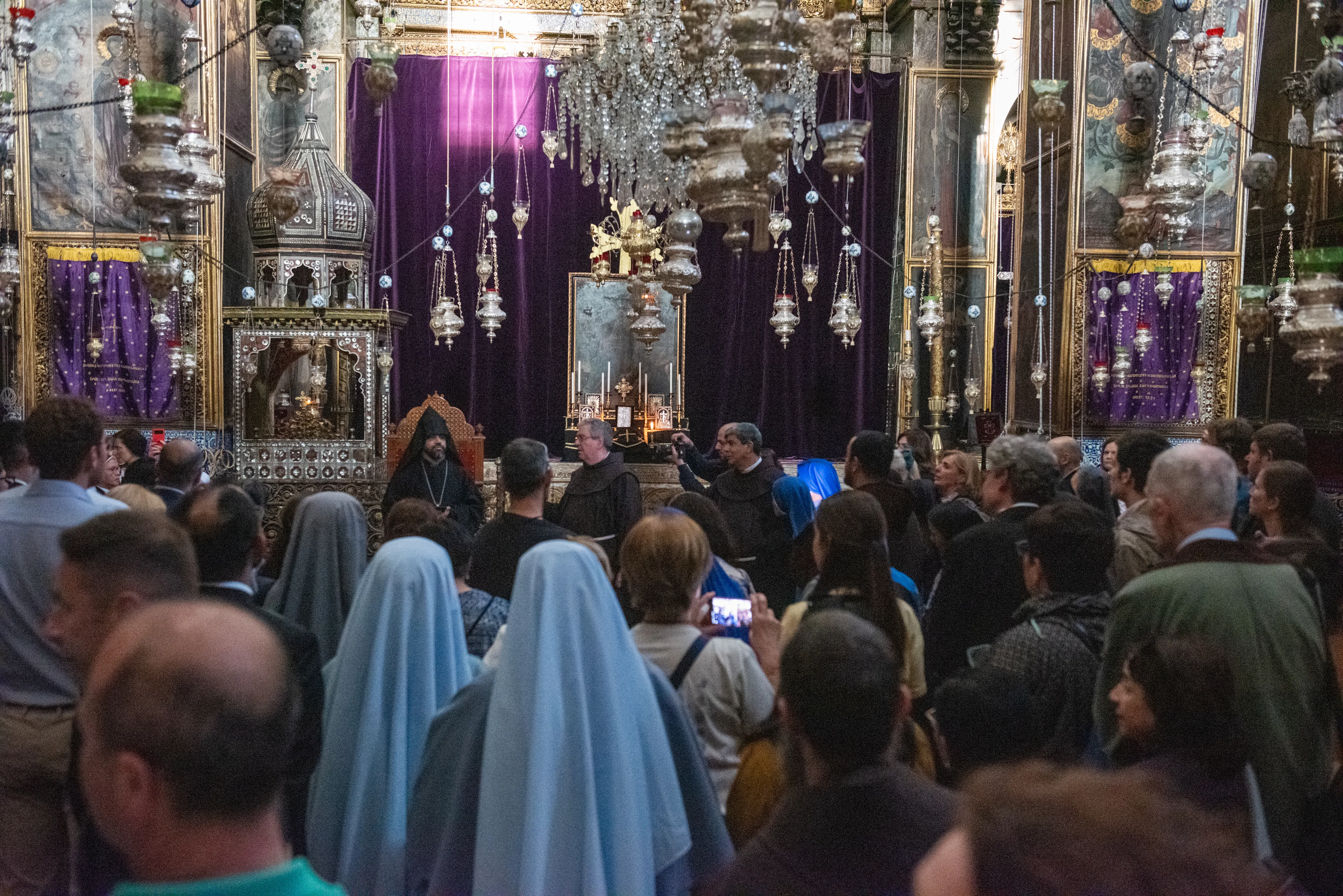
“Even if the Cenacle cannot return to our hands,” Klimas explained, “we ask at least to celebrate regularly, even with pilgrims, without the need for special permits.”
Negotiations on these matters (taxation and property) have been ongoing for over 25 years between the Holy See and the State of Israel, following the signing of the Fundamental Agreement in 1993 and the agreement recognizing the legal personality of the Catholic Church in Israel in 1997.
Despite the slow pace of diplomatic negotiations, some practical progress can be observed informally. The ability to celebrate Mass on Holy Thursday at the Cenacle is among these developments. Permissions to access the site on other special occasions are usually granted without significant issues as well.
After the Mass at the Cenacle, as tradition dictates, the Franciscans proceeded in a procession to three churches in two other symbolic places: the Armenian churches of St. James and of the Holy Archangels (of the Armenian Apostolic Church), and the Syro-Orthodox Church of St. Mark.
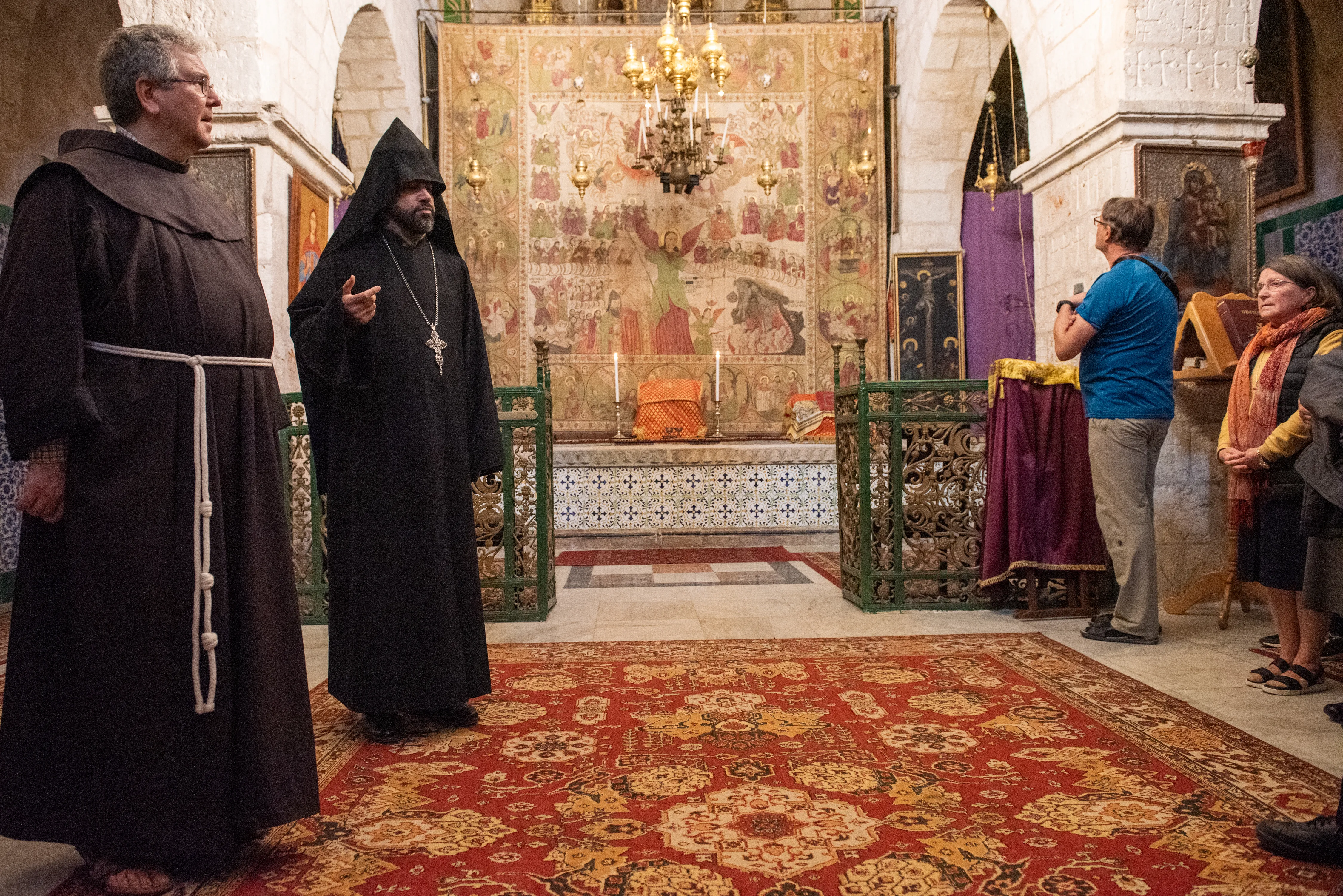
This yearly visit commemorates the hospitality the friars received in the 16th century. After being expelled from the Cenacle, the Franciscans were welcomed by the Armenians for seven years while the convent of St. Saviour was purchased, to this day the headquarters of the Custody of the Holy Land. Friars and faithful prayed together and received the blessing from the representative of the Armenian Apostolic Church.
The Syriac Orthodox Church of St. Mark is said to be built on the house of Mary, the mother of the evangelist Mark. According to Syriac tradition, this is the place where Jesus had the Last Supper. Here as well, those present prayed together and were able to listen to the Lord’s Prayer sung in Aramaic by one of the monks, who then gave a blessing.
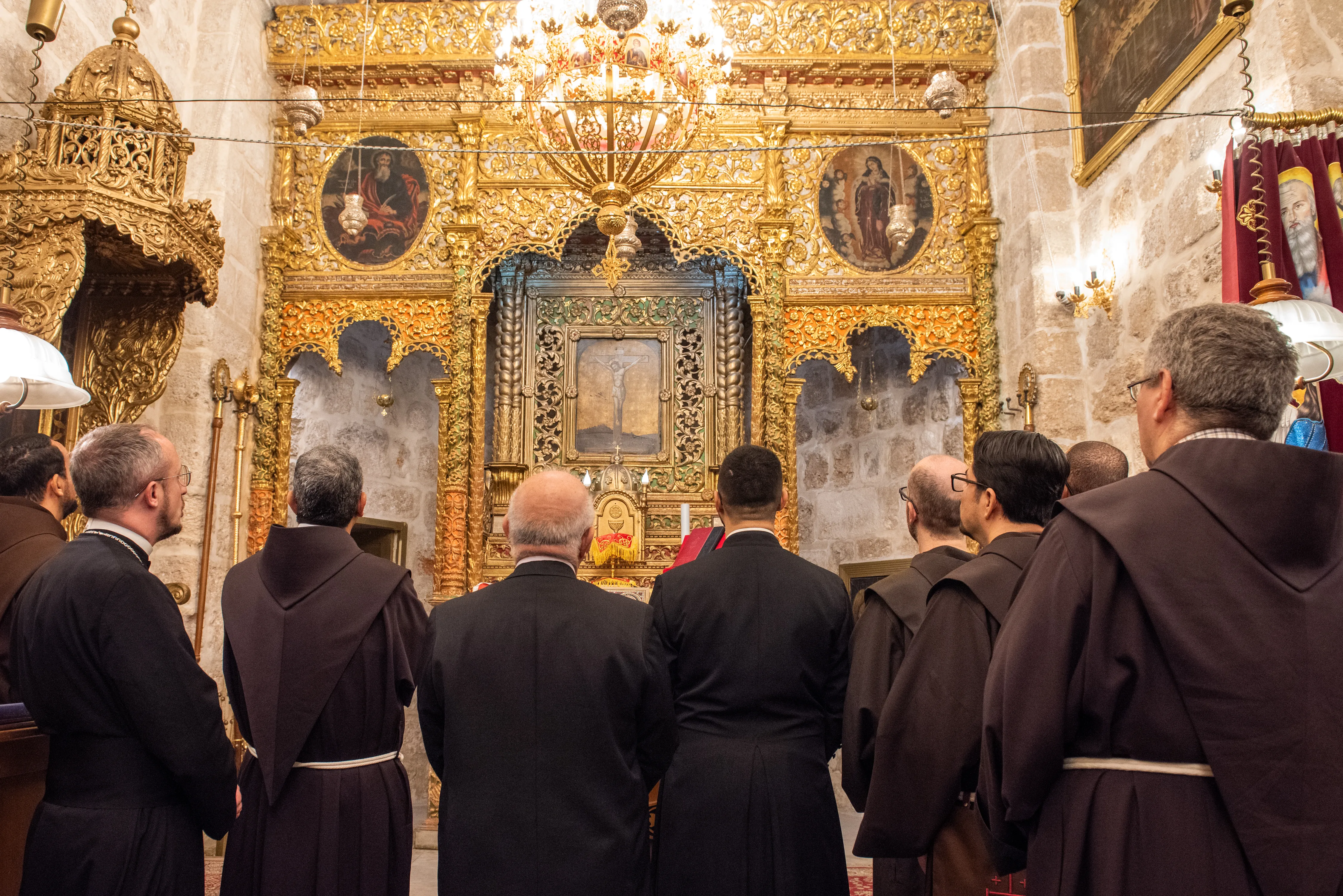

A Sacred Heart of Jesus Parish procession honoring the patroness of Cuba on Sept. 7, 2023. / Credit: Sacred Heart of Jesus parish in Havana, Cuba
ACI Prensa Staff, Mar 28, 2024 / 16:00 pm (CNA).
The regime of President Miguel Díaz-Canel in Cuba… […]

The Oregon State Capitol in Salem. / Credit: Zack Frank/Shutterstock
Washington, D.C. Newsroom, Mar 28, 2024 / 15:00 pm (CNA).
The Oregon Health Authority (OHA) is reporting a significant rise in assisted suicide prescriptions and deaths in the… […]

Pope Francis kisses the foot of one of the 12 women whose feet he washed at the Rebibbia Women’s Prison in Rome on Holy Thursday, March 28, 2024. / Credit: Vatican Media
CNA Staff, Mar 28, 2024 / 14:30 pm (CNA).
Pope Francis on Thursday washed … […]

null / Shutterstock
Washington, D.C. Newsroom, Mar 28, 2024 / 14:00 pm (CNA).
Governors Jim Justice of West Virginia, Spencer Cox of Utah, and Brad Little of Idaho — all Republicans — signed legislation in their states to enhance religious free… […]

null / Video_Creative / Shutterstock.
CNA Staff, Mar 28, 2024 / 13:30 pm (CNA).
A judge in Canada has ruled that a woman with autism can be granted her request to die by assisted suicide, overruling efforts by the woman’s father to halt the dea… […]

 South Dakota’s Governor Kristi Noem arrives to speak during the annual Conservative Political Action Conference (CPAC) meeting on Feb. 23, 2024, in National Harbor, Maryland. / Credit: MANDEL NGAN/AFP via Getty Images
South Dakota’s Governor Kristi Noem arrives to speak during the annual Conservative Political Action Conference (CPAC) meeting on Feb. 23, 2024, in National Harbor, Maryland. / Credit: MANDEL NGAN/AFP via Getty Images
Washington, D.C. Newsroom, Mar 28, 2024 / 13:00 pm (CNA).
A prominent pro-life group is praising South Dakota Gov. Kristi Noem for signing a “Med Ed” bill that it says will mandate the creation of an informational video to combat “abortion misinformation.”
According to a March 25 statement by Susan B. Anthony Pro-Life America (SBA), the South Dakota bill is the “first legislation of its kind drafted to end the confusion caused by the abortion lobby through direct education to doctors.”
Kelsey Pritchard, SBA state public affairs director, said in the statement that “though every state with a pro-life law allows pregnant women to receive emergency care, the abortion industry has sown confusion on this fact to justify their position of abortion without limits.”
“With many in the media refusing to fact-check this obvious lie, other states should look to South Dakota in combating dangerous abortion misinformation,” she said.
The bill, passed overwhelmingly by the Republican-controlled legislature, was signed into law by Noem, who is also a Republican, on Monday. Introduced by state Rep. Taylor Rehfeldt, who is a nurse, the bill requires the South Dakota Department of Health to create an informational video describing the state’s abortion law and clarifying when “life-threatening or health-threatening” exceptions apply.
Now that the bill has been passed into law the Department of Health has until Sept. 1 to create the video and accompanying informational materials. The video and materials will be posted to the Department of Health’s website for doctors and the public to use as a reference in understanding the state’s abortion laws.
South Dakota is one of 14 states that prohibit abortion through all nine months of pregnancy. While some states allow exceptions in cases of rape, incest, and fetal anomaly, South Dakota only makes exceptions in cases where the mother’s life or health is in danger.
The ACLU of South Dakota decried the bill when it passed out of committee, saying in a Feb. 28 statement that it “gives anti-abortion activists a guise to appear to care about pregnant patients while actually passing legislation that further enshrines anti-abortion cruelty.”
Pritchard, however, said that the new informational material will help to clear up confusion on when the exception allows an abortion to take place in the state.
“Regardless of political affiliation or whether someone is pro-life or pro-choice, South Dakotans of all philosophies can celebrate that moms will be better protected through direct education to our doctors on their ability to exercise reasonable medical judgment in all situations,” she said.
According to SBA, Kentucky and Oklahoma have also taken steps to clarify their abortion exceptions and the Texas Medical Board is currently considering issuing a clarification to its life of the mother exception.

 St. Paul’s Church, in Imphal, capital of Manipur state, after the church was set on fire in 2023. / Credit: Anto Akkara
St. Paul’s Church, in Imphal, capital of Manipur state, after the church was set on fire in 2023. / Credit: Anto Akkara
Bangalore, India, Mar 28, 2024 / 12:30 pm (CNA).
After Indian officials’ announcement that Easter Sunday would be a “working day” this year was met with widespread protests from Christians, the governor of the state of Manipur in northeast India issued a statement reestablishing the annual holiday.
The March 28 reversal by the Manipur government, which is led by the Hindu nationalist Bharatiya Janata Party (BJP) came within 24 hours after Manipur Gov. Anusuiya Uikey canceled the Easter holiday.
“In partial modification of the government order … dated 27th March, 2024, the governor of Manipur is pleased to declare that only the 30th March 2024 [Saturday] will be working day for all government offices,” the order read.
The previous day the government had announced that “the governor of Manipur is pleased to declare 30th [Saturday] and 31st [Sunday] March 2024 as working days for all government offices.”
Christians account for nearly half of Manipur’s population of 3.7 million.
Archbishop Linus Neli, who heads the 100,000-strong Catholic Church in the state, told CNA that the Church had protested the cancellations of the Easter holiday to government officials.
“We are storming the competent authority, awaiting reply,” Neli said.
A half an hour later, the archbishop shared with CNA the government’s “revised order regarding [Easter] working day.”
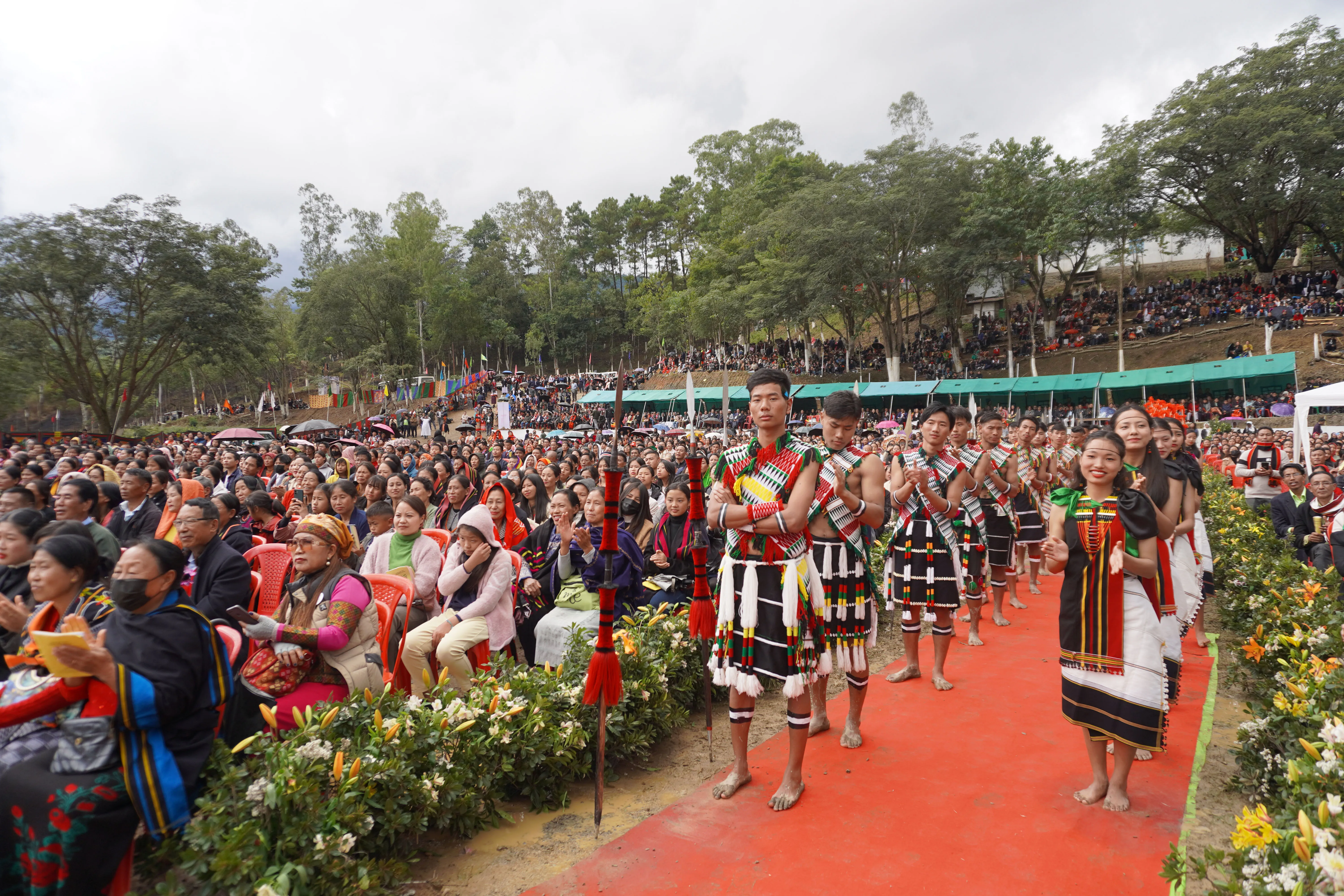
Prior to that, several Christian groups including those in Manipur had called for the cancellation of the order that stunned the Christians across the country.
“The decision to declare these sacred days as regular working days is not only insensitive but also disrespectful towards the religious sentiments of the significant portion of the population in Manipur,” lamented the Senapati District Catholic Union of Manipur in its condemnation of the governor’s order on the morning of March 28.
Of the 3.7 million Christians in Manipur state, 26% are ethnic Naga tribals, 16% are members of Kuki tribes, and more than 10% of the nearly 2 million Meiteis have also embraced the Christian faith in Manipur.
“By compelling government offices to operate on these holy days, the order not only disregards the religious rights of the Christian community but also fails to recognize the cultural diversity and religious pluralism that should be upheld and respected in democratic society,” the Senapati district Catholic forum pointed out.
“Height of insanity of the Manipur government,” a Christian pastor from Manipur who runs a theological college outside Manipur told CNA.
“What is happening is Manipur is nothing new,” John Dayal, an outspoken Catholic columnist and activist, told CNA.
“The BJP governments both at the national level and in several states had tried to insult and tinker with Christian holy days like Christmas, Good Friday, and Easter several times in the past,” Dayal pointed out.
“In 2002, I moved the Delhi High Court successfully against the bid to make Good Friday and Easter Sunday ‘working days’ against the Atal Behari Vajpayee [who was the BJP prime minister then],” said Dayal, a former member of the National Integration Council headed by the prime minister.
“This Manipur move is keeping with [Prime Minister] Modi’s consistent scheme to whittle away rights of Christianity and Islam in new ‘Bharat.’” (Bharat is the new name the Hindu nationalist BJP has proposed for India).
Since May 2023, Manipur has seen a protracted violent clash between the majority Meiteis, most of them Hindus, and the minority Kukis (all of them Christians) that has left more than 230 dead by the official conservative death toll. Over 50,000 Kuki Christians have been chased out from the Imphal valley along with over 10,000 Meiteis who were driven out from Kuki strongholds.
Amid the violence, over 600 churches have also been destroyed. The majority of them were Kuki, but 250 Meiti Christian churches were destroyed as well in what is seen as an attempt to stop Meiteis from embracing the Christian faith.
Meanwhile, in another piece of good news for the Christian community, Carmelite Sister Mercy, who had been arrested on a charge of “abetting the suicide” of a sixth-grade girl at the Carmel School in Ambikapur in central Chattisgarh state, was released on bail on March 28 by the trial court.
The girl student committed suicide at home after the nun had questioned her and two other girls for being together in the bathroom for a long period of time. After other students complained to the nun, she asked the girls to bring the parents to school the next day.
Following the suicide of the girl, Hindu nationalist organizations promptly organized a huge crowd to march to the school. Police were brought in and arrested the nun the next morning. Although the large crowd tried to storm the school on Feb. 8, police prevented an arson attack.

Trump announced his Bible project on social media during Holy Week, saying he partnered with country singer Lee Greenwood on the initiative. / Credit: Screenshot/EWTN News Nightly
CNA Newsroom, Mar 28, 2024 / 12:00 pm (CNA).
Republican presiden… […]
© Catholic World Report